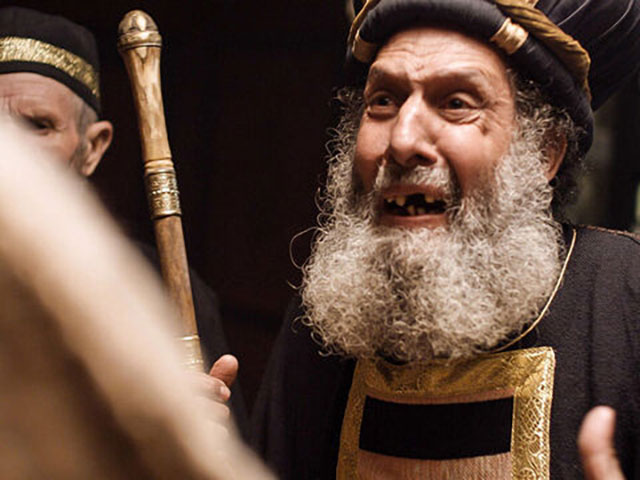Click above to watch video.
OR
Click below to play audio and read along.
Good Monday to you my ‘Walking with Jesus” friends,
We live in a hero world, don’t we? Sports heroes, political heroes, business heroes, in fact with social media now almost anyone can be a hero, with millions of fans and followers! Sadly, we occasionally watch a popular hero turn villain and very bad things happen. Today as we return to Susa and the story of Mordecai and Queen Esther, we meet such a man named Haman.
Esther chapter 3 begins with Mr. Haman and his remarkable rise to power in the Persian Empire: “King Xerxes honored Haman son of Hammedatha, the Agagite, elevating him and giving him a seat of honor higher than that of all the other nobles. All the royal officials at the king’s gate knelt down and paid honor to Haman, for King Xerxes had commanded this concerning Haman. But Mordecai would not kneel down nor pay him honor.” (Esther 3:1,2)
Have you noticed my friends that when reading the Bible, it’s important to pay attention to what might seem insignificant words or comments or even lineage? In this case the lineage of Mr. Haman is vitally important and is the reason Mr. Mordecai refused to bow or pay him any honor. Can you find it?
The key word is “Agagite”. That word identifies Haman’s ethnicity and his ancestry. Do you see the word ‘Agag’ in Agagite? “Agag” is a very significant name in the Biblical history of Israel, do you remember him?
“Agag” was a vicious king of the people group called the “Amalekites”. As the Hebrew slaves were leaving Egyptian slavery with Moses leading them, Exodus 17 gives us the story of God’s miraculous provision of water flowing out of solid rock, to nourish these fleeing slaves and their animals. That place was called Rephidim and was known to be a place in the desert with NO water. (Ex. 17:1)
Suddenly, with God’s miracle, cool, fresh water was pouring out of a rock with sufficient flow to serve 1 million people and their animals, Rephidim was no longer simply a waterless place in the desert. Rephidim was suddenly very valuable. A vicious, nomadic people called the ‘Amalekites’ came to attack these Israelites and drive them away from that precious, God provided, water spouting rock.

God instructed Moses and Joshua with a plan for defending themselves and the precious God provided water. God’s plan involved both prayer and fighting. Moses, Aaron and Hur stood on the hilltop, holding Moses hands up to the LORD while Moses prayed, and Joshua led courageous slaves in defending the God provided water and their families.
The record says: “So Joshua overcame the Amalekite army…Then the LORD said to Moses, ‘write this on a scroll as something to be remembered…because I will blot out the name of ‘Amalek’ from under heaven. Moses built an altar and called it ‘Jehovah Nissi’, ‘the LORD is my Banner’... the LORD will be at war against the Amalekites from generation to generation.” (Exodus 17:8-15)
This event was so significant a new name for God was pronounced there, “Jehovah Nissi”, and the victory God gave them at Rephidim has been a rallying battle cry for Israel ever since!
Several generations later, as the prophet Samuel was growing old, the Israelites clamored for a human king. You perhaps remember that story and how Saul was selected to be Israel’s first king. God reminded Samuel of the historic danger of the Amalekites and their constant opposition to the people of Israel. Samuel gave King Saul his first directive from God: destroy the wicked Amalekites completely. (1 Samuel 15) Saul unwisely spared Agag, the king of the Amalekites, and the best of the animals taken from the Amalekites as booty of war.

That act of disobedience disqualified Saul from continuing as King of Israel with God’s blessing. God sent Samuel to confront Saul with his disobedience, and then Samuel executed wicked king Agag. (1 Samuel 15:32,33) Samuel then made this powerful leadership proclamation which has challenged the best of Israel’s leaders ever since: “To obey [the LORD] is better than sacrifice…for rebellion is like the sin of divination and arrogance like the evil of idolatry.” (1 Samuel 15:22,23) Saul had turned away from God’s directive, trusted in himself and taken for himself some of the booty of war. Saul was no longer qualified to be king of Israel, for no king of Israel could turn his back on God and expect God’s blessing or help.
Mordecai and all Jewish men would have known both those historical events very well and evidently Mordecai also knew of Haman’s heritage as a descendant of wicked king Agag. Mordecai, who we saw yesterday was among those privileged men to sit at the King’s gate, would normally be quick to obey commands from King Xerxes, but this command for Mordecai to bow and give honor to Haman an Agagite was simply too much. In addition, of course, Mordecai knew God’s clear directive that God’s people would bow to no one other than Almighty God. (Ex. 20:1-6) So Mordecai refused, and it quickly drew the attention of others at the king’s gate.
I wonder if Mordecai had in his mind the great story of Daniel’s three friends who refused to bow before the gigantic statue of King Nebuchadnezzar. Do you remember they ended up in the extra hot furnace, and then suddenly a fourth man, Jesus, joined them in that furnace! That story found in Daniel 3? That event with Daniel’s three friends in Babylon happened almost exactly 100 years before this situation with Mordecai and Haman in Susa.
The Esther record says some officials at the King’s gate inquired of Mordecai: “Why do you disobey the king’s command? Day after day they spoke to Mordecai, but he refused to comply. Therefore, they told Haman about it to see whether Mordecai’s behavior would be tolerated, for Mordecai had told them that he was a Jew.” (Esther 3:3)
Oh my, I think we need to pause right here. Mordecai knew his refusal to bow before Haman would be disobedience to King Xerxes and a great offense to Haman. Mordecai assumed it would be only a matter of time before he would be called to give an account for his actions.
As Mordecai waited, I presume he prayed, as Moses had prayed, and as Samuel had prayed. What would God do to protect Mardecai from arrogant, flamboyant King Xerxes and egotistical, self-consumed Haman the Agagite?
Let’s return here tomorrow and we’ll find out. For today, here’s a worship song to help us consider how God wants you and me to respond, as Jesus would respond, to the challenges facing us in our societies, all around the world.
Bible images provided with attribution to www.LumoProject.com.
Have a comment or question about today’s chapter? I’m ready to hear from you, contact me here.

Pastor Doug Anderson
“Let us run with perseverance the race marked out for us, with our eyes fixed on Jesus…” (Heb. 12:1,2)
Archived back issues of “Walking with Jesus” and other resources are available by clicking here to open our ‘home page’ (or go to HOME at upper right of this page).
Share with friends. Subscribe below for daily “Walking with Jesus”.


